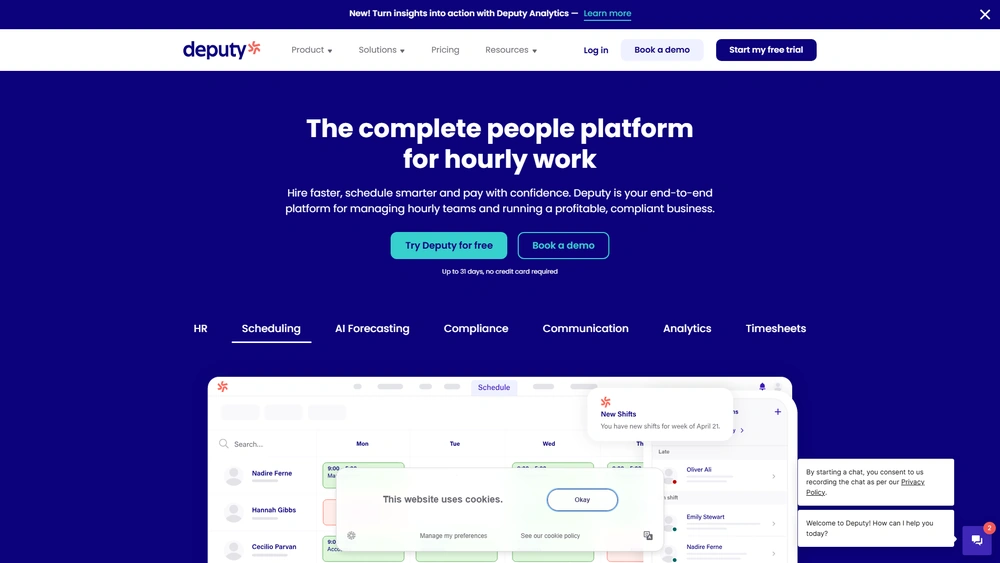Deputy Overview & 2026 Industry Position
Deputy is a workforce management platform designed to simplify scheduling, time tracking, and communication for businesses with hourly staff. In 2026, its strategic positioning centers on AI-enhanced scheduling, compliance-driven automation, and deeper integrations with payroll and HR systems — empowering managers and employees alike. Trusted by over 340,000 workplaces globally, Deputy stands out for turning complex scheduling into a few clicks, regardless of business size or sector.
From Launch to 2026: Deputy’s Journey
Deputy began in 2008 in Sydney, Australia, originally built to solve scheduling issues for one aviation services company. Over the years, it evolved into a global SaaS platform simplifying team management across industries. Key timeline highlights include:
- 2012: Launches cloud-based scheduling with mobile apps
- 2015: Expands globally with presence in North America and Europe
- 2017: Introduces integrations with major payroll providers (e.g., ADP, Gusto)
- 2020: Launches in-app health checks for COVID-19 compliance
- 2023: Adds AI-powered auto-scheduling with labor demand forecasting
- 2025: Bolsters automation tools and predictive analytics for proactive workforce planning.
Deputy’s 2025 thesis: Enable every shift-based business to forecast and manage workforce needs in real time — intelligently, compliantly, and at scale.

Deputy Key Features
- Smart Scheduling: AI-assisted shift assignments using team preferences, availability, and labor compliance.
- Time Tracking: GPS-verified clock-in/out, facial recognition for kiosk time clocks, and mobile time tracking support.
- Labor Forecasting: Predictive engine that adjusts schedules based on historical sales, demand trends, and even weather.
- Compliance Safeguards: Automatic break planning and alerts for overtime, fatigue, or scheduling violations.
- Employee Communication: Newsfeed, shift notes, and push notifications to cut down on fragmented messaging.
- Tasking: Assign tasks by role, deadline, or priority, making workflows smoother for field teams.
Workflow & UX
Deputy is designed with simplicity in mind. Managers can publish a week’s worth of shifts in just a few clicks, while employees can update their availability and swap shifts directly from their phones. The drag-and-drop scheduler and clean calendar views make it easy to visualize staffing coverage, and system alerts help minimize manual errors.
The UX emphasizes minimal clicks, real-time updates, and native mobile performance across devices. Admin tasks like exporting timesheets, approving shifts, and viewing coverage forecasts are centralized in a single dashboard, reducing app-switching fatigue.
Deputy Pricing Analysis & Value Metrics
Deputy offers tiered pricing to accommodate businesses of all sizes. As of July 2026, here’s a breakdown:
| Plan | Monthly Price (Per User) | Includes |
|---|---|---|
| Scheduling Only | $3.50 | Shift planning, auto-scheduling, availability |
| Time & Attendance | $3.50 | Clock-in/out, timesheets, break compliance |
| Premium | $6.50 | Scheduling + Attendance, integrations, reporting |
| Enterprise | Custom | Advanced analytics, API access, VIP support |
Value Insight: Premium secures the best ROI for SMBs needing compliance + payroll syncing — while Scheduling-only is perfect for lean teams just getting started.
Competitive Landscape
| Platform | Best For | Key Features | Pricing |
|---|---|---|---|
| Deputy | SMBs & Multi-location operators | AI scheduling, compliance, integrations | From $3.50/user |
| Homebase | Small hospitality teams | Scheduling, hiring, limited payroll | Free for 1 location |
| When I Work | Retail chains, restaurants | Messaging, auto-publish shifts | From $4/user |
| 7shifts | Restaurants only | Labor tools, tip pooling | From $34.99/location |
Use Cases
- Restaurants & Cafés: Streamline back/front-of-house shifts, manage labor peaks, and log real-time tasks during service.
- Retail Chains: Coordinate coverage across departments/stores with unified oversight and labor budget forecasting.
- Healthcare Clinics: Balance rotating shifts for nurses and technicians while remaining OSHA-compliant.
- Logistics & Warehousing: Schedule around demand spikes, automate overtime alerts, and integrate payroll.
- Franchise Ops: Maintain branding and labor standards while empowering location managers with autonomy.
Deputy Integrations
Deputy integrates with over 45 major platforms, helping businesses smooth data flow from scheduling to payroll and insights. Notables include:
- Payroll: ADP, QuickBooks, Gusto, Paychex, Square Payroll
- Point-of-Sale: Square, Lightspeed, Vend, Toast
- CRM & HR: BambooHR, Xero, Zoho People
- Productivity: Zapier, Slack
The Deputy ecosystem grows steadily, with custom API access available on Premium and Enterprise plans.
Pros & Cons
- ✅ Smart scheduling saves hours weekly
- ✅ Seamless connection to payroll & POS
- ✅ Flexible plans & user-based fees
- ❌ May require onboarding for full configuration
- ❌ Lacks built-in hiring/recruiting tools
Pro Tip: Activate labor cost forecasting inside Deputy Premium early — it highlights hidden overspend risks before they hit.
Final Thoughts
If your business relies on shifts, compliance, and coordination across teams, Deputy offers a top-tier SaaS experience. Its thoughtful design and predictive capabilities make it ideal for operations where staffing meets unpredictability. While it won’t replace full HR or hiring platforms, Deputy threads the needle between simplicity and power. It’s a strong 2025 contender for SMBs balancing budget-conscious scale with service reliability.
Deputy FAQ
Yes, Deputy offers a 31-day free trial with full feature access so businesses can test functionality before subscribing.
Yes. Deputy supports scheduling, compliance, and reporting across multiple business locations with centralized controls.
Deputy integrates with Gusto, ADP, QuickBooks, Paychex, Xero, and several others via API or native connections.
Absolutely. Many restaurants use Deputy to manage peak times, rotating shifts, and compliance with local labor rules.
Deputy provides chat and email support across all plans. Enterprise subscribers gain VIP onboarding and a success manager.

